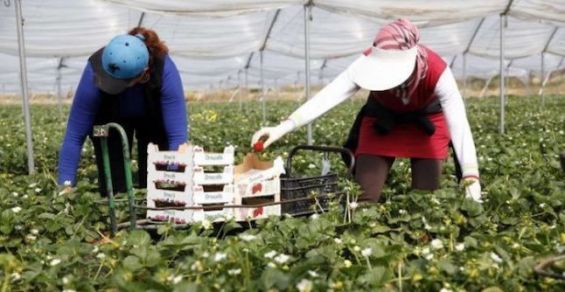After it imposed a major lockdown, suspending air and sea travel and restricting outdoors activities, Spain has been forced to find an alternative solution to save the harvest season for this year.
Unable to rely on seasonal field workers from Morocco and other countries to pick fruits, the Iberian kingdom is turning to migrants and other unemployed workers to fill the gap.
According to Spanish newspaper, La Vanguardia, the preventive measures taken by both Spain and other countries, including Morocco, to avoid the spread of the novel coronavirus have taken a toll on the agricultural industry within the peninsula.
The same source reveals that the regions of Murcia, Catalonia and Aragon, in southern Spain, are in the need of «100,000 to 150,000 workers to cover labor shortages in the fields».
Immigrants and tourism workers to save the harvest
To overcome the crisis, local governments in Spain and agricultural organizations are trying to employ workers from the tourism industry who lost their jobs during the coronavirus lockdown. Moreover, other organizations from the agricultural field called for employing immigrants with an irregular status in Spain.
«The fruit harvest campaign will start in two weeks, and we expect a good harvest, but what can ruin the season is the shortage of labor», Eduardo Lopez, head of the labor sector coordinating farmers and livestock organizations in Spain, told the same website.
Lopez said that during the lockdown, fruit consumption has risen putting farmers in a bad situation given the insufficient number of harvesters. «One week after Spain declared a state of health emergency, the consumption of fresh fruits increased by 23% compared to the same period last year», he said, adding that «the same thing goes for the consumption of processed fruits, which increased by 27%».
The same site stated that a campaign had been launched to employ workers on farms in areas known for fruit harvesting. «The question remains as whether these two seasons will completely cover the demand», said Miguel Padilla, one of the agricultural producers from the municipality of Laureqa, in Murcia. «Local residents who worked before in fruit harvesting prefer to stay home over coronavirus fears», he said.
Each year, Spain is used to receive foreign workers from a group of countries, including Morocco. In 2019, 285,000 seasonal workers were employed, with 40% of them coming from outside of Spain.
In January, the Spanish authorities had revealed it was planning to receive 20 thousand Moroccan seasonal workers for the strawberry fields in the Huelva region. Five thousand of them had worked in the same fields in the past years, 11,500 have worked in strawberry fields before and 7,500 were going in for the first time.
Unfortunately, these workers have seen their work contracts postponed because of the coronavirus crisis and the travel bans that followed the eruption of the virus in both Spain and Morocco.





 chargement...
chargement...













